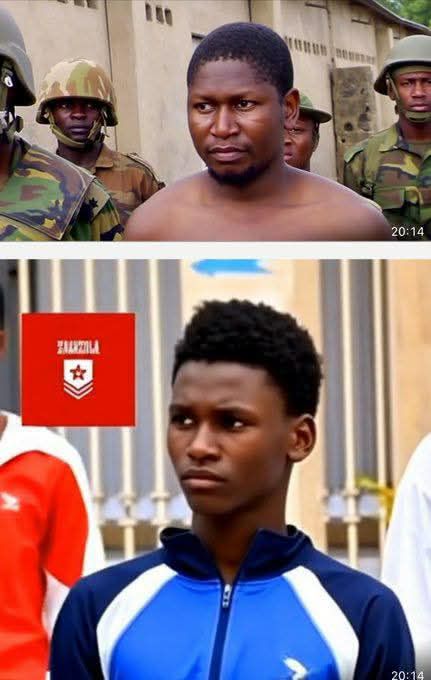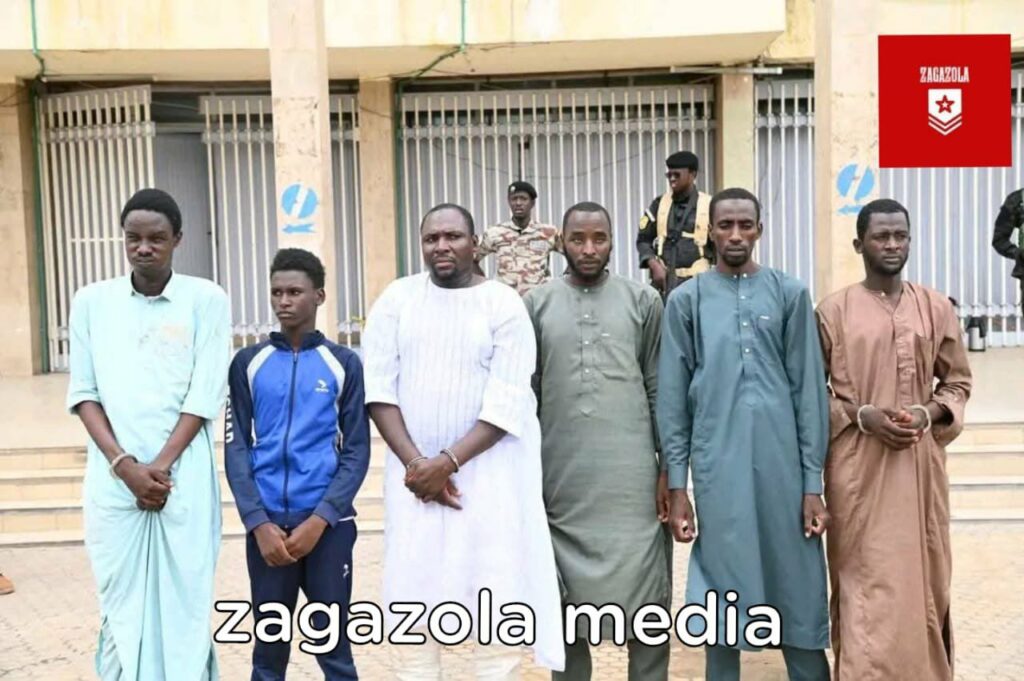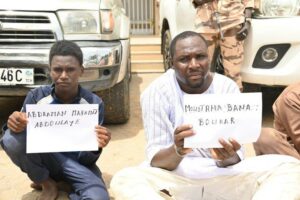
Exclusive photographs obtained by counter-insurgency expert Zagazola Makama have confirmed the arrest of Abdrahman, the 18-year-old son of late Boko Haram founder Mohammed Yusuf, during a major security operation in Chad.
Security analysts have described the development as one of the most symbolic breakthroughs in the Lake Chad Basin’s counter-terrorism efforts in recent years, with implications for the wider fight against jihadist insurgency in Nigeria, Chad, Niger, and Cameroon.
According to intelligence sources, Abdrahman was captured alongside five other suspected fighters during a Chadian military raid targeting Islamic State West Africa Province (ISWAP) cells near the Lake Chad region. Reports suggest he was not a mere foot soldier but already functioning as a field commander, leading a six-man terror unit.

Photographs obtained by Zagazola show the teenager in a blue tracksuit, standing among older suspects. His striking resemblance to his father, Mohammed Yusuf, has drawn significant attention, symbolizing the continuity of violent extremism within the Yusuf family.
Although Chadian authorities confirmed the arrest of six individuals linked to ISWAP, they declined to release names, citing ongoing investigations. However, multiple security officers familiar with the case identified the lead suspect as Abdrahman.
Abdrahman is believed to be the younger brother of Habib Yusuf, also known as Abu Mus’ab Al-Barnawi, the widely recognized leader of ISWAP. This revelation underscores the enduring influence of Mohammed Yusuf’s family in shaping the direction and leadership of both Boko Haram and its ISWAP offshoot.
Born in Nigeria shortly before Boko Haram’s insurgency escalated in 2009, Abdrahman is thought to have been groomed in recent years into ISWAP’s operational structure, continuing the militant legacy of his father.

Mohammed Yusuf founded Boko Haram in the early 2000s, preaching against Western education and governance. His death in police custody in 2009, after a failed uprising in Maiduguri, turned him into a martyr figure. His deputy, Abubakar Shekau, then transformed Boko Haram into one of the world’s deadliest terror groups, infamous for mass killings, bombings, and the abduction of schoolgirls.
In 2016, the group splintered after ideological disagreements, producing ISWAP under Yusuf’s son, Abu Mus’ab Al-Barnawi. Unlike Shekau’s indiscriminate brutality, ISWAP positioned itself as a more “strategic” insurgent faction, focusing attacks on military and government targets while still destabilizing the Lake Chad Basin. The insurgency has since killed more than 40,000 people and displaced millions across four countries.
Security analysts highlight three key implications of Abdrahman’s arrest: as the son of Boko Haram’s founder, his capture strikes at the mythology surrounding the Yusuf family’s leadership role in jihadist circles; neutralizing his cell denies ISWAP a vital operational node in the Lake Chad region; and his interrogation could yield critical insights into ISWAP’s leadership, recruitment, supply chains, and foreign contacts.

The arrest also reflects the success of regional cooperation. Chad, often at the frontline of anti-terror operations, continues to play a decisive role within the Multinational Joint Task Force (MNJTF), which includes Nigeria, Niger, and Cameroon.
Though Chadian officials remain cautious, the arrest is expected to be welcomed by Nigeria and its neighbors. Counter-terrorism experts believe it could boost morale within the MNJTF. International stakeholders such as the African Union, the European Union, and the United States, who support counter-insurgency operations in the region, are also likely to see the arrest as a positive step.
Despite this major breakthrough, analysts caution that ISWAP and Boko Haram remain resilient. Both groups continue to exploit poverty, unemployment, and weak governance to recruit young fighters. Abdrahman’s capture may prompt ISWAP to stage retaliatory attacks as a show of strength. With its decentralized command structure, the group has demonstrated an ability to quickly regenerate leadership. Analysts stress that long-term peace in the Lake Chad Basin will require not just arrests but comprehensive socio-economic and governance reforms to undercut extremist recruitment.
For millions across the region who live under the shadow of insurgency, the capture of Abdrahman offers a rare glimmer of hope. Yet experts insist the fight against terrorism is not about dismantling individuals alone—it is about addressing the root causes that sustain violent extremism.










